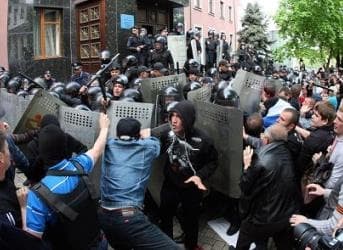The last few days have brought the worst violence yet since the ongoing struggle between the governments of Ukraine, Russia and their respective civilian supporters began, and power players on both sides are using the conflict to their advantage.
Russians agitate, oil rises
Russian President Vladimir Putin's spokesman, Dmitri Peskov, recently told reporters that thousands of people in Ukraine are calling for Russia's help, and claimed that human rights violations are becoming more widespread in Ukraine.
That rhetoric is similar to the language used by Russia before its invasion and subsequent annexation of Crimea, but sources who spoke with CNBC said they don't expect an outright Russian invasion. What's more likely, they said, is continued agitation and violence.
The sources spoke on condition of anonymity because of fears about their personal safety and/or concern about their financial interests.
Oil and gas are the lifeblood of the Russian economy, and in the midst of geopolitical unrest, oil prices usually rise.
"Higher oil and gas prices are always good for Russia, but Putin thinks far more strategically than that," said Ian Brzezinski, a senior fellow at the Atlantic Council who focuses on trans-Atlantic security. "I would also note that he is not just benefiting from the unrest in Ukraine, he is driving it. This is because he wants to destabilize Ukraine so that he can seize more of it, if not all of it."
Putin seeks to maintain some level of control over Ukraine as a crucial gas transit hub for Russian natural gas. Sources close to the Russian government said that Putin currently does not have plans to invade, but one of the sources said "he will not allow Ukraine to become Estonia"—that is, he's highly unlikely to stand by and idly watch Ukraine integrate itself with the European Union or NATO.
Related Article: Weakening Russian Energy Sector May Not Support Geopolitical Ambitions
"Ukraine's economic crisis had been transformed into geo-economic warfare caused by Russia's control of supply to Europe and Ukraine's failure to develop its own internal energy resources," Robert Bensh, managing director of Pelicourt, a private equity fund that owns assets in Ukraine, told CNBC.
"And it cannot be coincidental that Russian troops are building up close to Ukraine's gas pipelines," he added.
According to journalist Alexei Matsuka of eastern Ukraine's Donetsk and alternative Russian news channel TV Rain, "the activity of separatists is mainly in the north of the region, where there is a lot of shale gas."
Still, others say that the shale play is minimal here and that Russia is looking solely to retain control to make sure it has a firm hold on alternate routes of its own gas supplies.
More than one observer who spoke with CNBC predicted that only when there is an integrated government in Ukraine, with a substantial amount of Russian influence, will Russia finally back off.
How Ukraine's leaders benefit
The Ukrainian government, which has warned repeatedly that the most dangerous days of the crisis still lie ahead, has used the unrest to its advantage as well.
The conflict allows acting Ukraine President Oleksandr Turchynov and Prime Minister Arseniy Yatsenyuk to appeal directly for assistance from the United States and the European Union.
A source close to the situation told CNBC that in the earliest days of the crisis, Kiev refused to speak with the Russians, allegedly telling high-level Moscow officials that Ukraine no longer needed Russia because it had the EU and United States on its side.
Related Article: Why Hasn’t The U.S. Gone After Gazprom?
In the past week, Turchynov has presented a situation in eastern Ukraine that is beyond the Kiev government's ability to handle alone, openly admitting that Ukraine's police and security forces are "helpless" when it comes to dealing with violence and unrest.
Oligarchs playing both sides
Wealthy individuals within Ukraine have tried to cut deals with Russia in an effort to secure power in case Russia continues to have influence in certain regions of the country, sources told CNBC.
Stratfor Eurasia Analyst Eugene Chausovsky told CNBC that, although he can't confirm the names of so-called "oligarchs" who have reached agreements with Russia, Moscow does have channels of communication to many leading Ukrainian business and political figures.
Sources who asked not to be identified cited former Prime Minister Yulia Tymoshenko as a power player in Ukraine who maintains close contact with the Russian side. Tymoshenko currently trails Petro Poroshenko, the front-runner in Ukraine's upcoming elections.
ADVERTISEMENT
Unrest in Ukraine helps Tymoshenko politically, a local source told CNBC, because she's seen as an experienced politician who can provide leadership through the crisis.
The Washington Post, citing Russian news service Interfax, reported Tuesday that Tymoshenko called publicly for the formation of a "volunteer army" that can handle pro-Russian outbreaks in place of the country's regular military.
Stratfor's Chausovsky told CNBC that there is also speculation that some domestic oligarchs in eastern Ukraine could have fomented the separatist threat shortly after the uprising as a bargaining chip with Kiev's new pro-Western leadership to preserve their domestic political power and business interests.
Stratfor's Chausovsky said he doubts that Tymoshenko was behind any unrest in eastern Ukraine, however, saying such claims are unconfirmed and "dubious at the very least."
The oil and gas issue is likely to remain front and center, experts said, with Putin playing his strong hand and attempting to determine just how far he can go without provoking the U.S. and European Union to hit back even harder than they already have.
"People are genuinely nervous about what will happen. It's a house of cards, everyone is under threat," one source said.
By Dina Gusovsky of CNBC
Source: http://www.cnbc.com/id/101646149


















